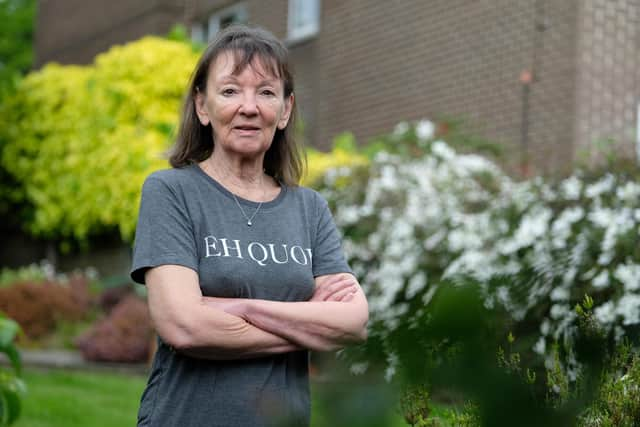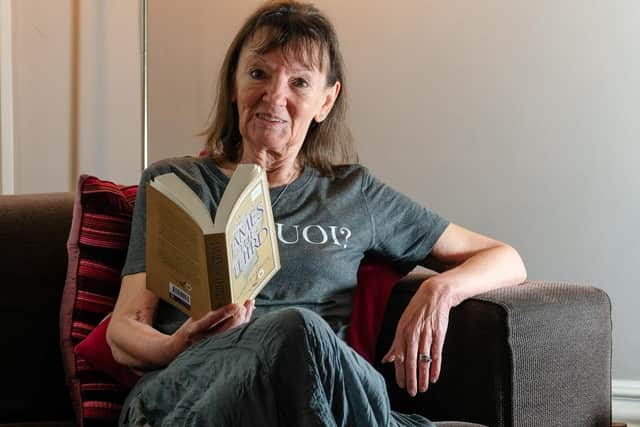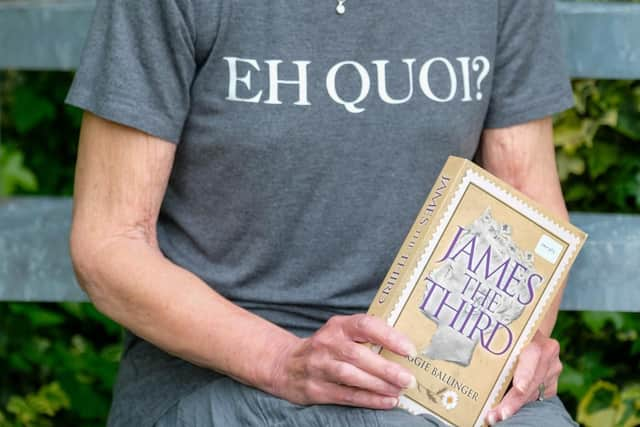Sheffield author reimagines Royal history with Princess Elizabeth having a younger brother
and live on Freeview channel 276
That’s the Royal ruse of Sheffield author Maggie Ballinger, whose book James the Third reimagines recent history with Princess Elizabeth having a younger brother.
Scandal? There’s lots of that, all informed by a keen historian who worked in the NHS while writing and painting.
Advertisement
Hide AdAdvertisement
Hide AdMaggie, aged 71, lives in Nether Green and the idea for her book came from a conversation at home with husband Stephen.


He is an important part of the creative process and following a debate about heirs her latest book took shape.
“Stephen asked me what’s the difference between heir apparent and heir presumptive. Because I’m a historian, I’m interested in this and of course Britain is awash with these traditions,” she says.
“The queen can trace her ancestors to Alfred the Great and we do ceremony, reverence and ritual so well.
Advertisement
Hide AdAdvertisement
Hide Ad“Pageantry, the Last Night of the Proms, has a huge effect on us. James was a re-imagining of events, I don’t want to spoil the surprises but he becomes king in 1952 and I’ve been kind to the Queen Mother by making her Regent.”


The back story is that in 1936, the Duke of York unexpectedly became King George VI, and his ten-year-old daughter, Princess Elizabeth, became heir presumptive.
However, she was never heir apparent, because a male sibling would automatically assume her place in the line of succession.
So what would have happened upon the late arrival of a baby brother for the grown-up Princesses Elizabeth and Margaret?
Advertisement
Hide AdAdvertisement
Hide AdAfter King George VI's death in 1952, the United Kingdom's next sovereign would have been a very young boy, and one in need of a regent.


James the Third tells that boy's story. How does his reign unfold? He is clever, resourceful and unconventional − but can he alter the course of history, given the limited role of a constitutional monarch?
Does he find true love, or must he accept second best? And, with the births of his heirs, what does the House of Windsor look like now? Set against rapidly changing times, there is a parallel tale of two working class sisters from the East End of London.
As fans of the royal family, they are closer to the crown than they could ever imagine. Blending the twists and turns of fiction with historical fact, this book is sure to please anyone who enjoys a glimpse of life behind palace walls.
Advertisement
Hide AdAdvertisement
Hide AdThere’s also a scandal which is uncovered by a journalist called Rob Rainsmith, an anagram of journalist Martin Bashir who did the infamous Panorama interview with Princess Diana.


But that’s enough plot, what about the author? Maggie grew up in Surrey and references places she knows in her writing.
“It makes the process easier because you can draw on your own history,” says Maggie.
She moved to Sheffield in 1980 after getting a job as assistant personnel officer at the Northern General Hospital.
Advertisement
Hide AdAdvertisement
Hide AdMaggie, whose two daughters were born in the city, spent 10 years at the Northern and then moved to Jessop Hospital as a unit general manager before joining the board of the Hallamshire Hospital as director of HR.
She views Sheffield as home.
“I had been in Leeds. After that, Sheffield felt like home,” she says.


“They say it is the biggest village in the country and it is. Sheffield is a city with a village feel and it is amazing how many people you bump into around the country are from here.”
During her time in the NHS, she was known as Maggie Taylor and retired in 2002, deciding on a change of direction. “All the time I was working in the NHS, I was writing and painting.
Advertisement
Hide AdAdvertisement
Hide Ad“I wrote verses for wedding speeches, my blog spot has 200 verses on it.”
In fact, she had been writing since 1970. “Numerous completely rubbish novels that I stored in a shed and were eaten by mice,” says Maggie. Rubbish or not, they proved useful.
“I couldn’t have done James without having had that experience of novels I never submitted.
“I’ve revised a couple, they need some drastic editing which I learned a lot about when writing James. I might resurrect them.”
Advertisement
Hide AdAdvertisement
Hide AdHer first published work was Baa Baa Pink Sheep in 2012, which came about when one of her grandchildren asked what about a pink sheep? She wrote verses on sheep of all colours.
That was followed by Britannia’s Glory in 2019 which started after Maggie won a limerick competition seven years earlier run by the Shipwrecked Mariners Society.
Her effort was rewarded with a barometer and she suggested writing a pamphlet to record Britain’s maritime history to generate funds for the society.
Maggie studied history so this was second nature and by the time she finished the work, it covered 140,000 words.
Advertisement
Hide AdAdvertisement
Hide AdJames the Third is shorter, at 100,000 words and South Yorkshire features in the book. “There’s a scene in James set in 1974 during the Miners Strike, when he visits Killamarsh,” says Maggie.
“He’s in a pub called The Crown because he wants to see what’s going on from the ground.
“But he’s almost found out because he doesn’t take his glass back to the bar. A friend says ‘It’s like you have people picking up after you.’ Of course, he does.”
She’s now working on the sequel after James was published on Accession Day, February 6.
Advertisement
Hide AdAdvertisement
Hide Ad“It has only just reached Waterstones, but it is in Orchard Square which is excellent,” says Maggie.
The sequel was going well until husband Stephen, a retired architect, waded in a few nights ago. “I was about half way through when Stephen scuppered the plot!”
She’s not too cross, though. “He plays an enormous part in what I do, is a proof reader extraordinaire, will tell me what is not up to standard and throws in plot ideas.”
So we shouldn’t be surprised to learn Stephen, 61, was born in Killamarsh, hence the king’s foray there.
Advertisement
Hide AdAdvertisement
Hide AdStephen says: “I have an eye for detail, I like things to be right, that’s what we strive for.
“It is sort of why I retired because perfection was unobtainable!”
The last 10,000 words of the novel are explanatory notes. “It is a social history of Britain from the late 1940s to the 90s, which has proved immensely interesting,” says Stephen.
“It ranges from the coalfields to Genesis.”
Maggie likes popular culture. She reached the last 500 of Britain's Got Talent in a poetry duo with her daughter but they were booed off as the microphones failed.
Advertisement
Hide AdAdvertisement
Hide AdShe’s left nothing to chance with James The Third. “Loads of research was required. Reference books, the internet, academics and friends old enough to remember were consulted.
“This wasn’t just about historical events, or complex matters of constitutional law.
“What terms, in those days, had yet to reach the dictionary? In the ’60s, informal music performances weren’t referred to as gigs.
“Was role model in common usage in the 1940s? All the findings, too good to waste, are included in the book’s set of explanatory notes.”
Advertisement
Hide AdAdvertisement
Hide AdTopics which interest them both and have led to a novel which has won plenty of praise.
“If you enjoyed the Crown you’ll enjoy this,” says Stephen. “Writing the sequel is proving even more entertaining,” adds Maggie.
Published by Unicorn, James The Third costs £7.99. It is available at The Next Chapter on Rustlings Road, Sheffield, and other bookshops.
